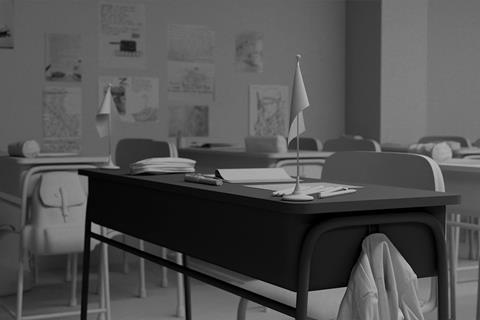Yulia Lokshina’s insightful film centres on an exiled Russian teacher working in Berlin

Dir/scr: Yulia Lokshina. Germany. 2025. 82mins
A woman with plastic bags over her shoes stands by an ugly metal fence in a snowy forest on the periphery of Moscow, berating construction workers who are trying to clear the land to build a school. Far away in Germany, a teacher of English who fled her homeland in the Russian Far East works on a role-playing exercise with her high school students. It is, we soon realise, based on the story of how the teacher herself was denounced by one of her pupils back home for criticizing the war in Ukraine.
A thoughtful and thought-provoking study of coercion and resilience
Active Vocabulary, which makes its debut in DOK Leipzig German competition, works by accretion. At first we struggle to connect its two stories, and there’s a distinct sense that the director is on the same journey, questioning her material, teasing out its significance, with no clear answers. That’s frustrating at times, especially near the beginning. But it’s refreshing too. The film never condescends to its viewers, or its subjects. It builds to become a thoughtful and thought-provoking study of strategies of coercion and resilience, especially as related to education.
Released in 2020, Lokshina’s first full-length documentary, Rules Of The Assembly Line, At High Speed also juxtaposed a workplace clash with a school ‘performance’, setting the appalling conditions in a German industrial abattoir against rehearsals of Bertolt Brecht’s anti-capitalist play Saint Joan Of The Stockyards by a class of high-school students in Munich. That went on to tour a slew of documentary festivals, and Active Vocabulary looks set to follow a similar path. A serious Covid19 outbreak in the pork processing facility a few months after Rules of the Assembly Line made its debut turned the film into something of a news story. The topical magnet here will be audience curiosity in an aspect of Putin’s Russia still poorly reported in Western media: how the state’s propaganda machine works to win over hearts and minds, and enforce patriotic hegemony.
Early on, the director informs us in voice over that in February 2020, a few days before Russia’s invasion of Ukraine, she was in Moscow, filming for a documentary she was planning about the city’s rapid expansion. In 2012, a presidential decree vastly increased Moscow’s municipal area by annexing a swathe of sparsely populated land, much of it forest. Satellite images and blueprints found online detail one of the projects: a school, due to be dropped into the middle of nowhere – rooads and the rest will inevitably follow. Shaky handheld camera documents the brave and vocal protest of a group of women against the destruction of this natural environment. The twist is that, apart from a foreman, all of the construction workers are from Central Asia, and speak only rudimentary Russian.
Later, we’re in a high school in Berlin’s ethnically diverse Moabit district. A teacher called Maria talks, again in voice over, about how she ended up here. She’s Russian, and used to teach English in a rural school in the far-flung Transbaikal region. One day, she got into a discussion about the war in Ukraine with the four students in her class – and one of them secretly recorded her less than orthodox views. Maria became an object of investigation for the Russian security services and, later that year, escaped to Germany. Now, with her German high-school students, she’s developing a series of exercises and role-playing games that circle around her story and its implications.
Computer-generated 3D animations of the school that is being built in that forest outside Moscow are interspersed with the sensitive schoolroom camerawork of Nina Wesemann, DoP for the Berlin footage. Students gather around a world map, talking about their origins; very few are the children of German-born parents. They’re in seventh grade, aged around 12 or 13, and the camera captures all the self-consciousness and vulnerability of this liminal age as well as its thirst for connection.
These kids on the brink of adulthood anchor the director’s nuanced discourse about educational freedom and indoctrination. Russian government guidelines about how to talk to students about the ‘special military operation’ in Ukraine are outlined via a mix of captions and voiceover; so is a West German educational missive from the 1970s known as the ‘ban on overwhelming’, designed to prevent radical teachers from unduly influencing their young charges.
When Maria asks her English class which school subjects are political, most agree that maths is one the few ‘pure’ disciplines unaffected by politics. Later, when we have all but forgotten the exchange, on-screen captions present a school maths test set in Russia in the summer of 2022; it’s all about adding, subtracting, dividing and multiplying the number of soldiers on parade or the number of machine guns that will fit into containers.
Later still, when the Russian foreman is elsewhere, the stand-off in the forest between Kirghiz construction workers and protesting Muscovite women becomes a tentative conversation about exploitation and oppression. What Lokshina’s limber film does most eloquently is to collapse the distance between ‘here’ and ‘there’ and encourage us to think about its issues not just as a case of Russia vs the West, but a theme with universal resonance, requiring universal vigilance.
Production company: oficina de objetos perdidos
International sales: Yulia Lokshina, objetos.perdidos@posteo.com
Producer: Yulia Lokshina
Editing: Maya Klar
Cinematography: Nina Wesemann
























